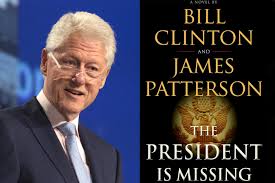Reading Time: 3 minutes
Bill Clinton was dwelling on journalism in the United States where every time a ‘mountain’ on President Donald Trump rises to the top of the news, a ‘molehill’ about Hillary Clinton also peaks. It is frustrating. This comparison. It drowns the “passion of the day”. The day Stormy Daniels takes centre-stage, Monicka Lewinsky becomes a sideshow. Raise Trump’s “Russia links” and Hillary Clinton’s “destroyed emails” invariably strays into the picture-frame. A report, for Different Truths.
Bill Clinton writes in his new book, The Missing President: “When you find a mountain to expose in one person or party, you have to pick a molehill on the other side and make it into a mountain to avoid being accused of bias. The built-up molehills also have large benefits: increased coverage on the evening news, millions of retweets, and more talk-show fodder. When the mountains and molehills all look the same, campaigns and governments devote too little time and energy debating the issues that matter most to our people. Even when we do that, we’re often drowned out by the passion of the day.”
Bill Clinton was dwelling on journalism in the United States where every time a ‘mountain’ on President Donald Trump rises to the top of the news, a ‘molehill’ about Hillary Clinton also peaks. It is frustrating. This comparison. It drowns the “passion of the day”. The day Stormy Daniels takes centre-stage, Monicka Lewinsky becomes a sideshow. Raise Trump’s “Russia links” and Hillary Clinton’s “destroyed emails” invariably strays into the picture-frame.
A top Indian television journalist, who had made it his signature mark to build molehills out of mountains and vice versa, says Bill Clinton speaks not just about journalism in America but that the former President’s words apply as much to journalism in India. He calls it “our obsessive indulgence in whataboutery”, the “bane of Indian journalism.”
As far as the TV anchor of BBC fame is concerned, Bill Clinton robbed the words out of his mouth, and Bill couldn’t have said it better! His admiration for Hillary’s husband mounts when he “stumbles upon” another gem in ‘The Missing President’: “It breeds more frustration, polarisation, paralysis, bad decisions and missed opportunities.”
At the core of the anchor’s argument is what he terms “false equivalence”, which is: “If we wish to expose something dreadful done by party A, we feel a need to balance it by finding a fault in party B. we consider this balance objectivity and, mistakenly, equate it with good journalism.”
His grouse is that when ‘Gujarat killings 2002’ is brought up, why sneak in ‘Sikh Slaughter 1984’? Why balance Narendra Modi’s faults with a critique of Rahul Gandhi’s tweets? Why rake up Indira Gandhi’s ‘Emergency’ when discussing undermined institutions under Modi rule? Why make mountains out of Rahul Gandhi’s molehills? Such comparisons take journalists nowhere, says the television journalist. The “balancing” only dilutes and diminishes.
There is no such thing as moral equivalence, only moral degradation, he insists. Two wrongs don’t make a right. Desist. “You can criticize Modi and the BJP without simultaneously striking at Rahul Gandhi and Congress. You can discuss the sins of today without recalling those of the past,” he writes with newfound reassurance from “missing President” Bill Clinton!
The anchor, who was not always ‘to the point’ while initiating debates on current topics on his television show and often strayed from the point of discussion to pick up similar points lost in time, wants journalists to steer clear of historical comparisons. It’s like don’t bring Socrates and Pluto into the politics of today. He should have said don’t compare Modi with Aurangzeb, like the Congress did recently, but he did not.
The molehills he reserves for the Congress and Rahul Gandhi, and the mountains to Narendra Modi and the BJP. He wears his bias on his sleeve and wants other journalists not to sport their coat of arms. There is a double standard in his insistence not to focus on two wrongs. Besides, he puts the journalist at a handicap. Not to repeat a crime is good advice to a criminal. Not to bolster a story with past equivalents is bad journalism.
Bill Clinton doesn’t want to be reminded of his past. He wants to forget, he wants everybody to forget. He doesn’t want “equivalence” and he decides if one is “false”. He doesn’t want him and Hillary to be the topic on ‘evening news’, the ‘retweets’ and fodder for TV shows. Bill wants to be left alone to his devices. It suits him to label his transgressions “molehills” and Trump’s “mountains”. There is no comparison, equivalence.
Journalists cannot resist comparisons, even “false equivalence”. Without them the story loses relevance, punch. Historical benchmarks are part and parcel of writing, journalistic or literary. Minus nuggets from the past, what good the narrative about the present? There are only so many ways to tell a story: Compare a hero with another hero, a villain with another villain or a hero with a villain; the good with the bad, and bad with the bad, 2002 with 1984. Two wrongs, both ought to be pointed out.
Sushil Kutty
©IPA Service
Photo from the Internet

















